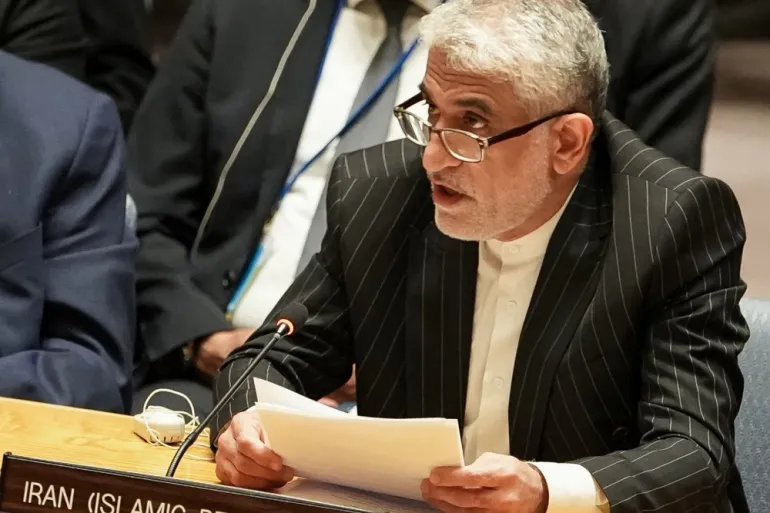Iran has strongly condemned what it describes as “reckless and inflammatory statements” made by former U.S. President Donald Trump, who recently suggested the use of force to prevent Iran from developing nuclear weapons. The remarks have significantly heightened tensions between the U.S. and Iran, particularly as both countries continue to navigate the delicate dynamics surrounding the 2015 nuclear deal, known formally as the Joint Comprehensive Plan of Action (JCPOA). The comments, made by Trump during media interviews, have led to a sharp response from Iran, with Tehran warning the U.S. that “any act of aggression will have severe consequences.”
The controversy began when Trump, in a recent interview with Fox News, stated that halting Iran’s nuclear ambitions could be achieved either “with bombs or with a written piece of paper,” further emphasizing his willingness to make a deal without resorting to military force. “I’d love to make a deal with them without bombing them,” Trump added, which, while indicating a preference for diplomacy, also left the door open to aggressive military action. This rhetoric, coming on the heels of renewed tensions in the region, as well as Trump’s reactivation of his “maximum pressure” policy against Iran, has sparked alarm in Tehran. This policy, initially pursued during his first term in office, centers on the application of strict sanctions and diplomatic isolation to push Iran into compliance with U.S. demands, particularly on its nuclear program.
In response to Trump’s statements, Iran’s representative to the United Nations, Ambassador Amir Saeid Iravani, penned a strongly worded letter to the UN Security Council, expressing Iran’s outrage over what he called Trump’s “deeply alarming and irresponsible remarks.” Iravani accused Trump of flagrantly violating international law, particularly citing Article 2(4) of the UN Charter, which prohibits the threat or use of force against sovereign states. In his letter, Iravani warned that any aggressive action from the U.S. would have “severe consequences” and that the U.S. would bear full responsibility for any such actions. Iran has consistently maintained that its nuclear program is intended solely for peaceful purposes, and it denies any intention to develop nuclear weapons, despite mounting international concerns over the country’s nuclear ambitions.
The recent comments from Trump, along with his decision to withdraw the U.S. from the landmark nuclear deal in 2018, have further complicated efforts to resolve the ongoing dispute between the two countries. Under the terms of the deal, Iran had agreed to limit its nuclear activities in exchange for sanctions relief, but after Trump’s withdrawal, Iran began to scale back its compliance, accelerating its uranium enrichment activities. According to reports from the UN nuclear watchdog, Iran has enriched uranium to levels nearing 60% purity, a significant step closer to weapons-grade material, raising alarms in the international community.
Efforts to revive the JCPOA under the Biden administration have yet to yield tangible results, with negotiations having stalled in recent months. While there were initial hopes that President Biden’s diplomatic approach would pave the way for a return to the agreement, the deadlock continues, and the future of the deal remains uncertain. Adding to the complexity of the situation, Iran’s Supreme Leader, Ayatollah Ali Khamenei, has categorically rejected any negotiations with the U.S. after Trump’s comments on seeking a “verified nuclear peace agreement.” Khamenei, citing previous failed negotiations with America, asserted that “no problem will be solved by negotiating with America,” signaling that Iran is unwilling to engage in any talks with the U.S. under the current conditions.
The geopolitical ramifications of this escalating situation are vast, as both nations appear locked in a standoff, each with their own set of red lines. Trump’s combative rhetoric has sparked significant unease in Tehran, which sees the potential for military conflict as an existential threat. Meanwhile, the U.S. continues to push for a complete reversal of Iran’s nuclear program, demanding full compliance with the terms of the JCPOA, even as Iran continues to enrich uranium and accelerate its nuclear advancements.
As the world watches closely, the situation remains highly volatile, and the stakes could not be higher for both global security and the future of nuclear nonproliferation. What lies ahead is unclear, but one thing is certain: the diplomatic and military pressure will continue to mount, and the consequences of any misstep could have far-reaching implications for the stability of the region and the world.
In the midst of these high-stakes developments, it’s crucial for the global community to stay informed and ahead of the curve. Don’t miss out on the latest updates on this crucial issue and other breaking news from around the world. Stay ahead with timely coverage of global news, trends, and in-depth analyses on business, innovation, leadership, and technology. Stay connected with us for real-time updates and insights that matter to you.
Join us on WhatsApp or Telegram for real-time updates. Have a report or article? Send it to report@theinnovationtimes.com. Follow us on X (Twitter), Instagram, LinkedIn, YouTube, Pinterest, and Facebook for more insights and trends.


